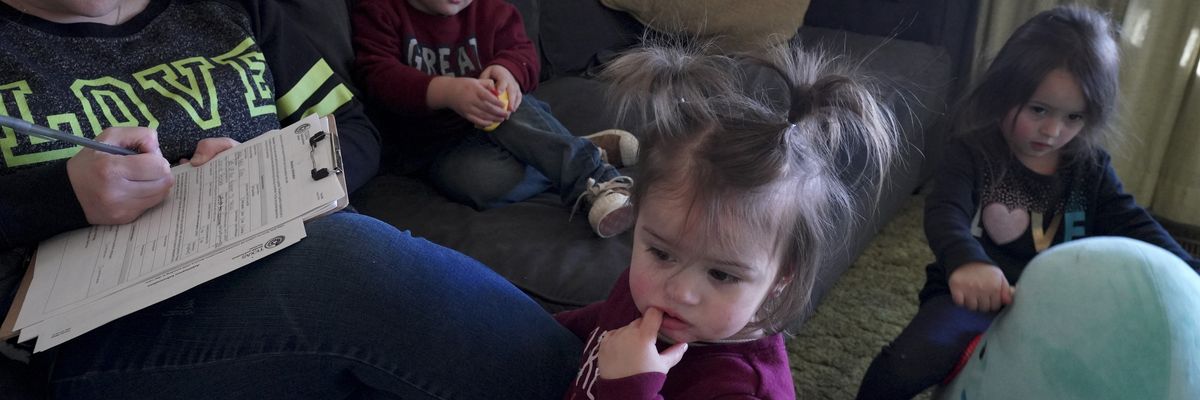The United States is barreling headlong toward a childcare disaster as House Republicans threaten to shut down the federal government, casting doubt on the prospects of a last-minute agreement to approve additional childcare funding before emergency allotments expire at the end of September.
Progressive lawmakers, advocates, and
childcare providers have been sounding the alarm for months, warning that the nation's already deeply flawed and difficult-to-access childcare system will be thrown into further chaos if funding approved during the coronavirus pandemic is allowed to lapse without any additional investments.
In a June
report, The Century Foundation estimated that more than 70,000 childcare programs across the U.S. will likely be forced to shut down without an infusion of funding. As a result, around 3.2 million kids could lose their childcare slots and states could lose nearly $11 billion in economic activity per year, the think tank found.
Separately, Sens. Bernie Sanders (I-Vt.) and Patty Murray (D-Wash.) released an
analysis in May indicating that childcare funding approved under the American Rescue Plan kept hundreds of thousands of childcare providers afloat during the pandemic and prevented roughly a million childcare workers from losing their jobs.
Murray said at the time that inaction from Congress would "likely force providers to lay off staff or shut down, force parents to leave work when they lose their childcare, and take a wrecking ball to our economic recovery."
Despite such warnings, the divided Congress
took no action on childcare before departing for their August recess, leaving lawmakers with less than a month to approve new funding and keep the doors of tens of thousands of childcare facilities open.
But there appears to be little urgency on the part of many lawmakers or the Biden White House, which did not include childcare money in its
supplemental funding request for a potential short-term deal to keep the government open.
A week before the White House sent its request to Congress, a group of Democratic lawmakers
implored the Biden administration to support an annual childcare investment of at least $16 billion per year.
"We need to make sure that childcare doesn't just fall over a cliff," Sen. Elizabeth Warren (D-Mass.) said in an interview last month.
A
large faction of House Republicans, meanwhile, has signaled that it is willing to force a government shutdown in an effort to secure steep cuts to federal spending and other far-right agenda items. In recent weeks, GOP appropriators have proposed major cuts to education programs, environmental spending, and more.
"I am fighting alongside House Democrats to avoid a childcare cliff on September 30th when emergency federal funding is set to expire," Rep. Jennifer McClellan (D-Va.)
wrote in a social media post on Tuesday. "Meanwhile, House Republicans propose $750 million in funding cuts to Head Start."
As
Politico reported last week, Republican lawmakers "have questioned how the [emergency childcare] cash was spent and expressed skepticism that more is needed." During a spring hearing, the outlet noted, Sen. Bill Cassidy (R-La.) accused Democrats of "promoting additional federal dollars under the guise of crisis."
But childcare providers across the U.S. have been speaking out for months, demanding urgent action from lawmakers as
emergency funding runs dry.
In May, more than 650 U.S. childcare providers
closed their doors for a day to highlight the sector's worsening crises, including woefully inadequate resources.
"I would invite anyone, especially our elected officials who are choosing not to fund the true cost of care, to come work at a childcare center for just a couple weeks while trying to pay all of your bills," Evelan Fountain, an early childhood educator at Family Circle Academy in Philadelphia, said at the time. "It's impossible."
Chabeli Carrazana of The 19th Newsreported last week that many U.S. childcare programs are already teetering on the edge of collapse, just barely scraping by thanks in part to emergency federal funding.
"All of those problems remain, but soon the money will be gone," Carrazana wrote. "For centers that have staved off closure, most of the costs will get passed on to parents in the form of tuition hikes in the fall that could push the most vulnerable kids out of care.
More than a third of programs serving infants and toddlers expect to raise rates after the funding runs out, according to a May survey of providers."
"Already, the annual cost of childcare exceeds the cost of in-state public university tuition
in 34 states, and that cost has been rising at a faster rate than inflation for three decades," she added. "But before widespread closures, services will contract and costs to parents will increase. It's already happening."

